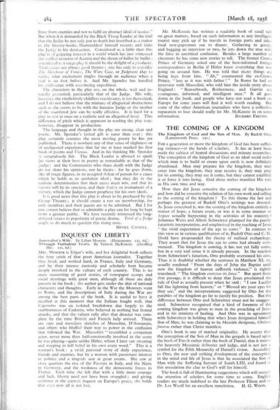INQUEST ON LIBERTY
MRS. MOWRER is Edgar's wife, and her delightful book reflects the fiery spirit of that great American journalist. Together they lived, and worked hard, in France, Italy and Germany, and by their intense curiosity and scholarly bent became deeply involved in the culture of each country. This is no mere recounting of good stories, of newspaper scoops and social meetings with great men, although all these are duly present in the book ; the author gets under the skin of national characters and thoughts. Early in the War the Mowrers went to Rome, and the descriptions of Italy during the War are among the best parts of the book. It is useful to have it recalled at this moment that the Italians fought well, that Caporetto was an isolated breakdown due largely to the stubbornness of Cadorna, who believed in nothing but frontal attacks, and that the valiant rally after that disaster was com- plete by the time British and French help arrived. There are sure and merciless sketches of Mussolini, D'Annunzio, and others who bluffed their way to power in the confusion that followed the War. Mussolini " resembled a competent actor, never more than half-emotionally involved in the scene he was playing—quite unlike Hitler, whom I later saw sweating and weeping in full belief in his own every word." This is a woman's book : a vivid personal story of daily experience, friends and enemies, but by a woman with passionate interest in politics and a ringside seat at great events. She saw at close quarters the rise of the Fascists in Italy, and the Nazis in Germany, and the weakness of the democratic forces in France. Each time she felt that with a little more courage and luck, liberty need not have been strangled ; and giving evidence at the current inquest on Europe's peace, she holds that even now all is not lost.
Mr. McKenzie has written a readable book of small talk on great matters, based on such information as any intelligent tourist may pick up if he travels in foreign parts and take, local newspapermen out to dinner. Gathering in gossip, and bagging an interview or two, he jots down the true with the false in uncritical confusion. Besides a large number of chestnuts he has some new stories to tell. The former Crown Prince of Germany asked one of the best-informed foreign correspondents in Berlin if Hitler knew everything that was going on around him. He was told that many things arc being kept from him. " Ah," commented the ex-Crown Prince, " just as it was with father ! " In Rome he had an interview with Mussolini, who told him the inside story about England : " Beaverbrook, Rothermere, and Garvin are courageous, informed, and intelligent men." It all goes down in the book, and people who have not read a book on Europe for some years will find it well worth reading. But some of the other American journalists who have a collective reputation to lose should really let Mr. McKenzie in on some














































 Previous page
Previous page